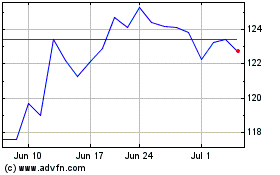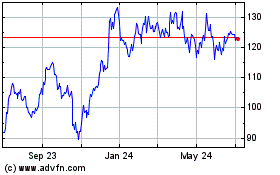By Peter Grant
The state of Kentucky's $16 billion pension fund has long
invested a portion of its assets in commercial-real-estate funds
managed by private-equity firms, but lately it is more interested
in funds that make loans than those that buy property.
That's because, like many other big investors, Kentucky
Retirement Systems is wary of the eight-year run of rising
commercial-real-estate values. If prices fall, the thinking goes,
it is less risky to be a lender than an owner of a property.
"Prices are really, really stretched," said Rich Robben, interim
chief investment officer of the Kentucky pension fund. "We feel, at
this point, we're happy to lend to you and let you take the
haircut."
Last year, debt funds raised $20.4 billion, up from $12.2
billion in 2015, according to data firm Preqin. Big real-estate
fund managers Blackstone Group LP, KKR & Co., Kayne Anderson
Real Estate Advisors, Och-Ziff Capital Management Group LLC and
Mesa West Capital all closed a debt fund in the past year or
started raising one.
Private-equity firm debt funds have financed much of the
residential, retail and office redevelopment that has taken place
in downtowns around the U.S. as millennials flock to urban centers.
In New York, debt-fund loans increased 60% from 2014 to 2016,
according to a study by CrediFi, a real-estate data and analysis
firm.
"There's a lot of high-quality real estate aside from 100%
occupied trophy buildings in Midtown Manhattan," said Ryan Krauch,
principal at Mesa West.
Examples of recent deals by Mesa West include the $210 million
loan it made last year to the owner of Chicago's John Hancock
Center. Before the 2008 financial crisis, a bank probably would
have made that loan, Mr. Krauch said. But most banks steered clear
because some tenants in the building are new and are still in a
free-rent period, he said.
"The competitive landscape disappeared," Mr. Krauch said.
For investors, debt is considered less risky than equity because
if values plummet, debt-fund managers can foreclose, making it more
likely they will preserve their principal investments. Equity
owners, meanwhile, could suffer losses or get wiped out.
For example, say an equity investor borrows $75 million from a
debt fund to buy a building that costs $100 million, putting in $25
million of equity. If that building's value falls to $85 million,
the equity investor has lost $15 million, but the debt fund will
still get repaid its entire $75 million.
At the same time, many debt funds are posting attractive
returns, from percentages in the high single digits to the
midteens, depending on their lending strategies. The prospect of
such gains in a low-interest rate world is like catnip to today's
yield-hungry investors -- particularly pension funds worried about
fulfilling commitments to future retirees.
Some debt-fund managers said they can produce such results by
using leverage to boost returns. In other words, they may lend, say
$75 million at a rate of 5% but borrow $50 million of that at a
rate lower than 5%. That way, their return is greater than 5%.
But the mushrooming of debt funds has prompted some real-estate
experts to sound warnings. None of the critics are saying a crash
is on the way. But some are advising investors to keep their eyes
open to the risks the funds are taking.
"There's a perception that when you say debt, it implies
safety," said Michael Stark, co-head of Park Hill Real Estate
Group, which advises private-equity firms on their capital-raising
efforts. "But if the collateral you're lending on is not a
stabilized asset, there's still some underlying risk that needs to
be priced accordingly," Mr. Stark said.
Commercial real-estate values collapsed after the financial
crisis and have rebounded in many places to record values in recent
years. But the prices have plateaued in many markets, sparking
concern among investors that they might not be getting adequately
compensated for the risk of owning equity.
Debt-fund managers say they are able to generate high yield
partly because traditional lenders haven't regained their precrash
appetite for making commercial real-estate loans, especially those
that finance new construction and fixer-upper projects. That makes
it a seller's market for the loans they provide, the fund managers
say.
Big banks are limited in part by new regulations imposed by the
2010 Dodd-Frank financial overhaul that make it more attractive to
focus on first mortgages and steer clear of riskier loans.
Critics of debt funds question whether the funds will be able to
keep up such returns as more pile in and compete with one another.
They also point out that banks could get more aggressive if the
Trump administration succeeds in easing regulation.
"Will the opportunity [offered by debt funds] be impacted by any
changes in regulation?" asked Mr. Stark of Park Hill.
Write to Peter Grant at peter.grant@wsj.com
(END) Dow Jones Newswires
March 14, 2017 05:44 ET (09:44 GMT)
Copyright (c) 2017 Dow Jones & Company, Inc.
Blackstone (NYSE:BX)
Historical Stock Chart
From Mar 2024 to Apr 2024

Blackstone (NYSE:BX)
Historical Stock Chart
From Apr 2023 to Apr 2024
